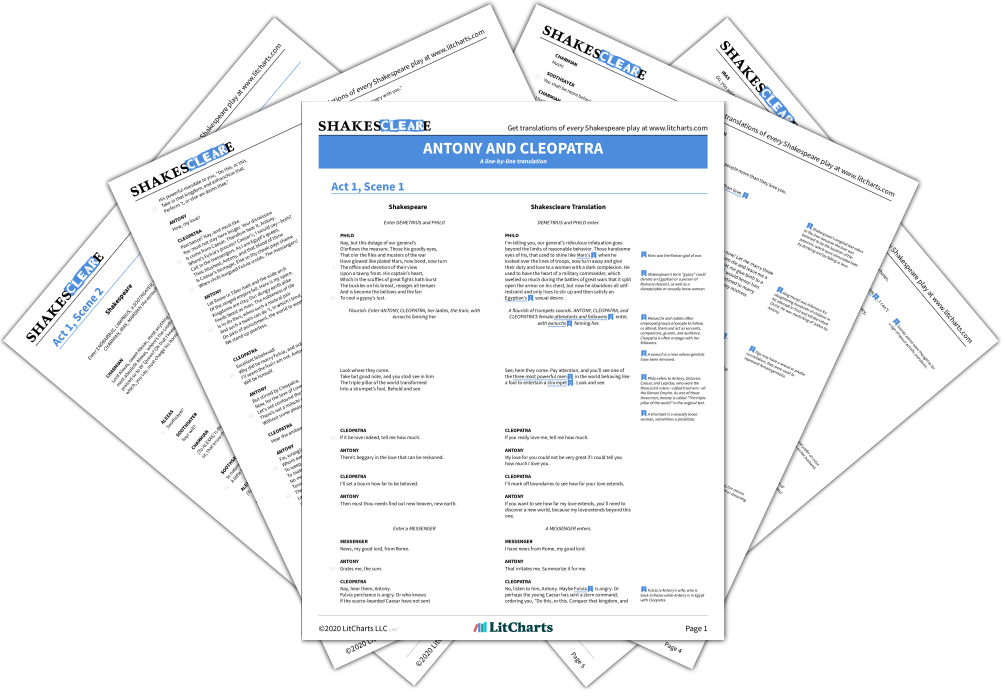Antony and Cleopatra Translation Act 3, Scene 1


Enter VENTIDIUS as it were in triumph, the dead body of Pacorus borne before him, with SILIUS, and other Romans, officers, and soldiers
VENTIDIUS
Now, darting Parthia, art thou struck, and now Pleased fortune does of Marcus Crassus’ death Make me revenger. Bear the King’s son’s body Before our army. Thy Pacorus, Orodes, Pays this for Marcus Crassus.
VENTIDIUS
Now the nation of Parthia, with all its archers, is defeated, and now fortune has given me the chance to avenge Marcus Crassus' death. Carry the King's son's body in front of our army. Your son Pacorus, Orodes, loses his life in payment for Marcus Crassus's death.
SILIUS
Noble Ventidius, Whilst yet with Parthian blood thy sword is warm, The fugitive Parthians follow. Spur through Media, Mesopotamia, and the shelters whither The routed fly. So thy grand captain, Antony, Shall set thee on triumphant chariots and Put garlands on thy head.
SILIUS
Noble Ventidus, while you still have momentum from the defeat of the Parthian army, follow the fleeing Parthians who have escaped. Ride through Media, Mesopotamia, all the places where the exiled Parthians hope to seek refuge. For this, your grand captain, Antony, will give you a triumphal procession on a chariot and crown your head with garlands.
VENTIDIUS
O Silius, Silius, I have done enough. A lower place, note well, May make too great an act. For learn this, Silius: Better to leave undone than by our deed Acquire too high a fame when him we serve’s away. Caesar and Antony have ever won More in their officer than person. Sossius, One of my place in Syria, his lieutenant, For quick accumulation of renown, Which he achieved by th’ minute, lost his favor. Who does i’ th’ wars more than his captain can Becomes his captain’s captain; and ambition, The soldier’s virtue, rather makes choice of loss Than gain which darkens him. I could do more to do Antonius good, But ’twould offend him, and in his offense Should my performance perish.
VENTIDIUS
O Silius, Silius, I have accomplished enough. Listen, it's possible for someone of low rank to overstep himself. You should be aware of this, Silius: it's better not to do something than to do it and thereby win too much glory while our commander is away. Caesar and Antony have won more battles through the skill of their officers than through their own ability. Sossius, a soldier in Syria with the same rank as myself, was Antony's lieutenant, and because he achieved glory too quickly and kept gaining it, he fell out of Antony's favor. Whoever accomplishes more in war than his captain becomes a greater soldier than him—and because soldiers are generally ambitious, a captain would prefer to lose a battle than have someone else win it and have him pale in comparison. I could accomplish more to help Antony's cause, but it would offend him, and if he were offended, I would lose all the glory of what I have already done.
SILIUS
Thou hast, Ventidius, thatWithout the which a soldier and his swordGrants scarce distinction. Thou wilt write to Antony?
SILIUS
A sword is just a tool, Ventidius, unless it is being wielded by someone with your qualities. You'll write to Antony?
VENTIDIUS
I’ll humbly signify what in his name, That magical word of war, we have effected: How with his banners and his well-paid ranks The ne’er-yet-beaten horse of Parthia We have jaded out o’ th’ field.
VENTIDIUS
I'll humbly tell him what we have done in his name, that magical wording. I'll tell him how, with his banners and his well-paid troops, we beat the calvary of Parthia out of the field like broken-down old horses, even though they had never been beaten before.
SILIUS
Where is he now?
SILIUS
Where is he now?
VENTIDIUS
He purposeth to Athens, whither, with what hasteThe weight we must convey with’s will permit,We shall appear before him. [To the soliders] On, there. Pass along!
VENTIDIUS
He intends to go to Athens, where we must meet him as fast as we can, given the load that we carry.
[To the soldiers] Keep going, there. Move along!
Exeunt














